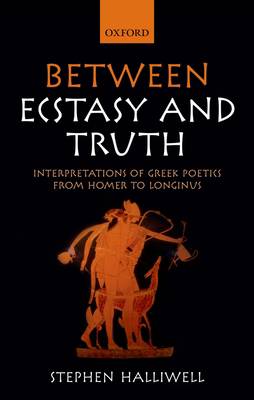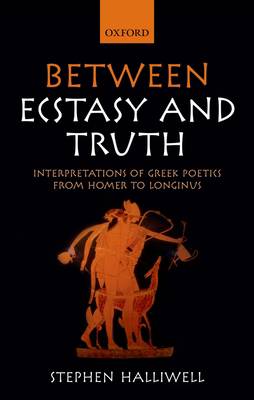
En raison d'une grêve chez bpost, votre commande pourrait être retardée. Vous avez besoin d’un livre rapidement ? Nos magasins vous accueillent à bras ouverts !
- Retrait gratuit dans votre magasin Club
- 7.000.000 titres dans notre catalogue
- Payer en toute sécurité
- Toujours un magasin près de chez vous
En raison de la grêve chez bpost, votre commande pourrait être retardée. Vous avez besoin d’un livre rapidement ? Nos magasins vous accueillent à bras ouverts !
- Retrait gratuit dans votre magasin Club
- 7.000.0000 titres dans notre catalogue
- Payer en toute sécurité
- Toujours un magasin près de chez vous
Between Ecstasy and Truth
Interpretations of Greek Poetics from Homer to Longinus
Stephen Halliwell
Livre relié | Anglais
225,95 €
+ 451 points
Format
Description
As well as producing one of the finest of all poetic traditions, ancient Greek culture produced a major tradition of poetic theory and criticism. Halliwell's volume offers a series of detailed and challenging interpretations of some of the most defining authors and texts in the history of ancient Greek poetics: the Homeric epics, Aristophanes' Frogs, Plato's Republic, Aristotle's Poetics, Gorgias's Helen, Isocrates' Treatises, Philodemus' On Poems, and Longinus' On the Sublime. The volume's fundamental concern is with how the Greeks conceptualized the experience of poetry and debated the values of that experience. The book's organizing theme is a recurrent Greek dialectic between ideas of poetry as, on the one hand, a powerfully enthralling experience in its own right (a kind of 'ecstasy') and, on the other, a medium for the expression of truths which can exercise lasting influence on its audiences' views of the world. Citing a wide range of modern scholarship, and making frequent connections with later periods of literary theory and aesthetics, Halliwell questions the many orthodoxies and received opinions about the texts analysed. The resulting perspective casts new light on ways in which the Greeks attempted to make sense of the psychology of poetic experience - including the roles of emotion, ethics, imagination, and knowledge - in the life of their culture.
Spécifications
Parties prenantes
- Auteur(s) :
- Editeur:
Contenu
- Nombre de pages :
- 432
- Langue:
- Anglais
Caractéristiques
- EAN:
- 9780199570560
- Date de parution :
- 20-02-12
- Format:
- Livre relié
- Format numérique:
- Ongenaaid / garenloos gebonden
- Dimensions :
- 142 mm x 216 mm
- Poids :
- 635 g

Les avis
Nous publions uniquement les avis qui respectent les conditions requises. Consultez nos conditions pour les avis.






